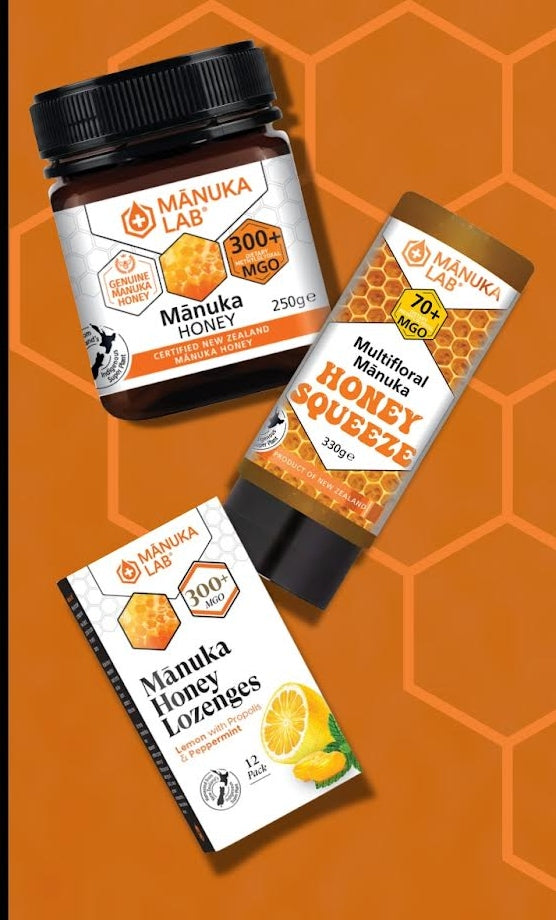

As a parent, choosing safe, natural health products for your child is a top priority. Mānuka honey, with its globally recognised antibacterial and wellness-supporting properties, is often considered a household essential. But is it suitable for children? And if so, at what age and in what quantity?
This in-depth guide will help you make an informed decision. We'll explore when children can safely consume Mānuka honey, how to choose the right grade, how it compares to other types of honey, and what the science and experts say. All information is based on trusted sources and aligned with the latest health recommendations.
What Is Mānuka Honey?
Mānuka honey is a premium variety of honey produced from the nectar of the Mānuka tree (Leptospermum scoparium), native to New Zealand. It contains a unique compound known as methylglyoxal (MGO), which gives it powerful antibacterial properties.
Unlike regular honey, genuine Mānuka honey is tested and graded for its MGO content and other quality markers, such as DHA (dihydroxyacetone) and leptosperin. This makes it a sought-after natural remedy for supporting immune function, soothing sore throats, aiding digestion, and promoting skin healing.
Is Honey Safe for Children?
Under 12 Months: Absolutely Not
According to the NHS, the consumption of any honey, including Mānuka honey, is not safe for infants under 1 year of age. This recommendation is in place to prevent the risk of infant botulism, a rare but serious condition caused by the bacterium Clostridium botulinum. These spores may be present in honey and, while harmless to older children and adults, an infant’s immature digestive system may not be able to handle them safely.
Key Rule: Never give honey to a baby under 12 months.
12 Months and Over: Generally Safe
Once a child reaches the age of 1, their gut has typically developed enough to safely process honey, including Mānuka honey. At this age, Mānuka honey can be introduced in moderation as part of a balanced diet.
Potential Benefits of Mānuka Honey for Children
After the first year, Mānuka honey may offer several potential health-supporting benefits for children when used appropriately.
1. Soothing Coughs and Sore Throats
One of the most common reasons parents turn to Mānuka honey is for its ability to soothe sore throats and mild coughs. The NHS also acknowledges that honey can be more effective than some over-the-counter cough medicines for children over 1 year of age.
Mānuka honey’s thick texture and antibacterial action can help coat the throat, reducing irritation and fighting bacteria.
2. Supporting Immune Health
Thanks to its high MGO content and natural antimicrobial properties, Mānuka honey may support the immune system, especially during cold and flu season. While it is not a cure, it can be a helpful addition to your child's routine when they are recovering or feeling under the weather.
3. Wound Care (Topical Use)
Medical-grade Mānuka honey has been used in clinical settings for wound care due to its antimicrobial and healing properties. Some parents apply small amounts of Mānuka honey to minor cuts or grazes as a natural alternative, though this should be done under guidance and only with products intended for topical use.
4. Mild Digestive Support
There is early evidence to suggest that Mānuka honey may promote gut balance due to its prebiotic and antimicrobial characteristics. Some parents report improved digestion or reduced symptoms of mild bloating or discomfort after including small amounts of honey in their child’s diet.
Choosing the Right Mānuka Honey for Children
When giving Mānuka honey to children, selecting the right grade and purity is essential. Here are key factors to consider:
1. Opt for a Moderate MGO Level
For general wellness or soothing occasional coughs, MGO 100+ to 200+ is usually sufficient. Higher grades like MGO 300+ or 525+ are more potent but are typically reserved for more specific adult needs or topical application.
-
MGO 100+: Gentle support, ideal for occasional use in children over 1.
-
MGO 300+: Moderate antibacterial strength, suitable for immunity support during seasonal illness.
2. Look for Certified Mānuka Honey
Ensure the product is:
-
Monofloral (contains nectar predominantly from the Mānuka plant)
-
Tested and certified for MGO content
-
Traceable to its origin in New Zealand
-
Packaged and handled according to UK and EU food safety standards
Manuka Lab’s range of MGO-certified honey, for example, is independently tested and clearly labelled to ensure safety and quality.
How Much Mānuka Honey Can Children Have?
While Mānuka honey is safe after 12 months, moderation is key due to its natural sugar content.
General Guidelines:
-
Ages 1–3: Up to half a teaspoon once per day
-
Ages 4–7: Half a teaspoon to one teaspoon per day
-
Ages 8+: One to two teaspoons per day if needed
It can be given:
-
On a spoon
-
Stirred into warm (not hot) water or milk
-
Added to porridge or yoghurt
Avoid giving honey in hot liquids over 40°C, as heat can degrade its beneficial properties.
Safety Considerations and Possible Side Effects
While generally well-tolerated, keep the following precautions in mind:
-
Allergy risk: Children with pollen or bee-related allergies should avoid honey unless approved by a healthcare professional.
-
Tooth health: As with any sugar, Mānuka honey can contribute to tooth decay. Ensure your child brushes their teeth after consuming it.
-
Medication interactions: If your child is on medication or has a health condition, consult a GP before using honey for medicinal purposes.
When to See a Doctor
Mānuka honey can help ease mild symptoms, but it should never replace medical treatment. Always contact your GP if your child has:
-
A persistent fever
-
A cough lasting more than three weeks
-
Breathing difficulties
-
Signs of an allergic reaction after honey consumption (rash, swelling, vomiting)
Final Thoughts
Mānuka honey can be a safe and beneficial addition to a child’s diet after the age of one. Its unique properties may offer support for immune health, sore throats, and general wellness when used in moderation and with care. However, it’s crucial to use the correct grade, source high-quality certified products, and follow current safety advice.
Manuka Lab’s carefully tested and MGO-certified honey is trusted by families across the UK and produced to rigorous standards in New Zealand. As always, if in doubt, speak to your child’s GP or a qualified nutritionist for personalised guidance.



